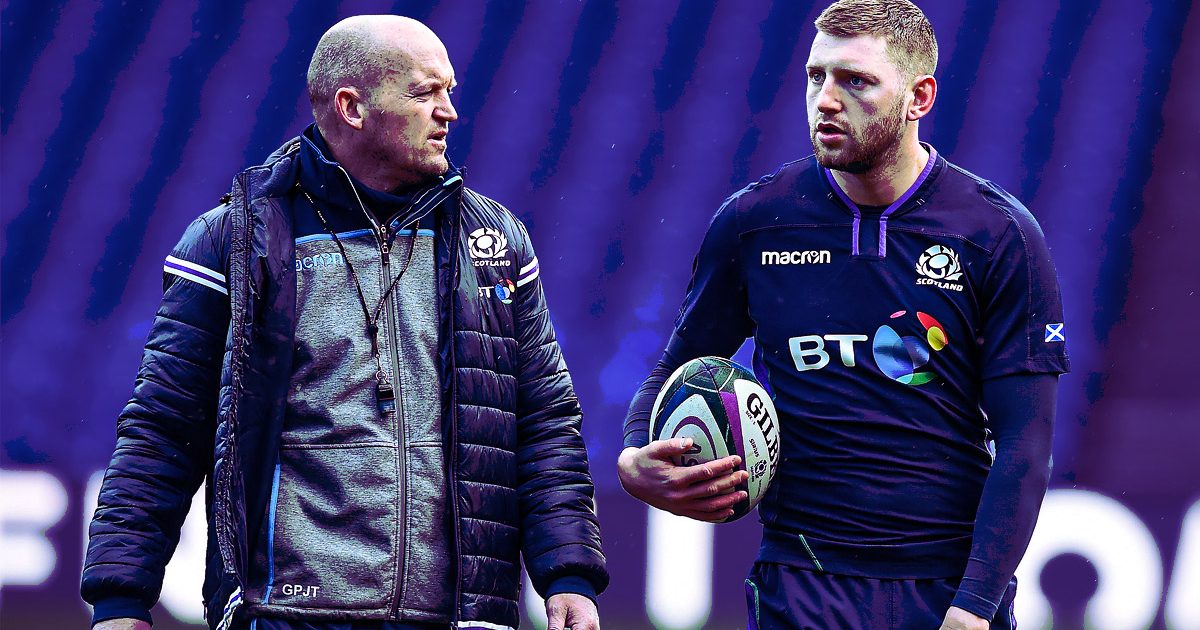For all the tough things Scotland did right, the stupid errors will have Gregor Townsend quietly fuming

Scotland’s first win over England at Twickenham since 1983 is reason for celebration but when Gregor Townsend and his troops re-group to assess the game heading into Round 2 of the Six Nations, there will be plenty of work-ons identified.
While the success should be praised, one win against England isn’t going to earn Scotland the Six Nations trophy and there will inevitably come a day where the bounce of the ball goes a different way and Scotland won’t be quite so lucky.
Yes, it’s taken almost 40 years to nab a win at Twickenham, but the victory must first be put into context.
Four of England’s starting team hadn’t played a game of professional rugby this year. Owen Farrell, Elliot Daly, Maro Itoje and Jamie George had been side-lined since the Autumn Nations Cup final in January and entered the fixture seriously short of match-fitness. Billy Vunipola, who played in a sole exhibition match for Saracens last month, is in a similar boat.
When players spend so long out from the game, they’ll either return to action refreshed and ready to fire, or rusty and under-prepared for the rigours of test rugby.
Argentina, in their four Tri-Nations matches last year, followed the former path. The likes of Farrell and Vunipola, on the other hand, looked like they were still on holiday when Scotland came to Twickenham.
Of course, fans were also on holiday from the venue – with the match played in front of an empty stadium. While it was technically an ‘away’ victory for Scotland, the fact that England weren’t buoyed on by their 16th man would have had a huge impact on their performance.
Wins against England don’t come easily for Scotland (the last came in 2018), so of course, the victory is still an accomplishment – but it’s not quite the level of accomplishment that the 38 years between drinks would typically indicate.
Townsend would have gone into the match without caring too much for history and while the win will have put a smile on his face, he’ll be much more concerned with the here and now – and what Scotland need to do to ensure that this isn’t the high point in their Six Nations campaign.
The coach would have been pleased with how well his charges handled themselves in the match and how they stood up to their big brothers, especially when they were reduced to 14 men either side of halftime.
What Townsend won’t be happy with, however, is that while they managed to do all the difficult things very well, they sometimes did the simple things incredibly poorly.
ADVERTISEMENT
View this post on Instagram
Right from the opening whistle, Scotland found themselves under the pump due to a poor box-kicking effort from Ali Price. Parked inside the 22, the Glasgow scrumhalf punted the ball directly into Maro Itoje’s outstretched arms and suddenly Scotland had to scramble.
The charge-down wasn’t entirely Price’s fault – his forwards needed to do a much better job of obstructing Itoje’s pathway to the halfback.
Price was lucky not to be marched from the field with his team a penalty-try behind after he shoved Itoje in the back when the England lock chased the charge-down but somehow, Scotland escaped.
Not much later in the game, Price’s box kick was again blocked by Itoje’s imposing figure and Townsend would have been pulling his hair out at the repeated mistake – if he had any.
The match was all about discipline – whichever team cracked first in the latter stages of the second half was going to find themselves in a very difficult position to win the game.
Thankfully, Scotland were able to control play and not make any silly errors, seemingly having used those all up in the first half. The fact that they had to play the match with 14 men for any period would have pained the coach, given it was due to an entirely stupid attempted trip from flyhalf Finn Russell.
Still, Townsend’s men rallied and heading into the final minutes of the encounter, camped inside the England 22, it looked like the game was done and dusted.
Then Russell decided to sit back for a drop kick.
PLAYER RATINGS@Gav_S_Harper ???rates the Scottish players after their brilliant Calcutta Cup raid on Twickenham #ENGvSCO #SixNations https://t.co/4iHeyxc6DI
— RugbyPass (@RugbyPass) February 6, 2021
It was the kind of play that would have made sense if Scotland were sitting pretty in front of the posts, but that wasn’t the case at all.
With less than a minute left on the clock, Scotland just needed to hold onto the ball to secure the historic win, but they teed up a hail-mary play that was unlikely to succeed.
Following an unsurprising charge-down from England, Scotland were lucky to hold onto the ball and had a second opportunity to wind-down the final 30 seconds of the game but instead replacement scrumhalf Scott Steele kicked into England’s 22.
The ball rolled just a little too far, however, and England were gifted possession not far out from their own 22-metre line.
It was always going to be a tough ask for England to cart the ball back and score the try which they would have needed to win the game and, from a Scottish point of view, thankfully they weren’t able to manage it – but they never should have been afforded the opportunity.
When the pressure was on and everyone expected Scotland to falter, they stood strong. They handled the English pack, comfortably getting the advantage at the set-piece, and managed to control the flow of the game even when they were a man down.
But too often throughout the match, they didn’t get the little things right – and it’s those little things that Gregor Townsend will no doubt be addressing in the coming days.












































































